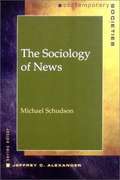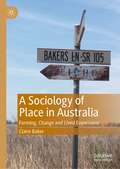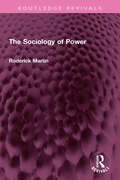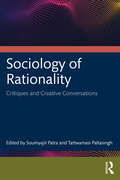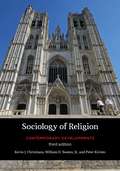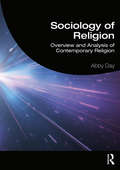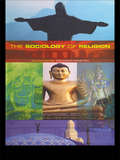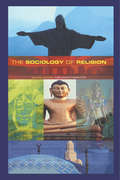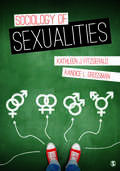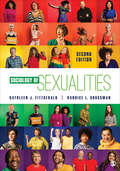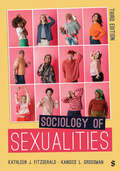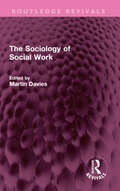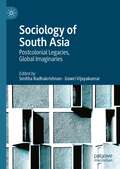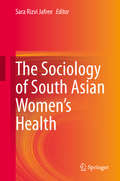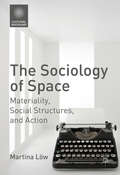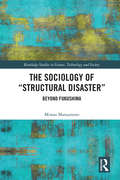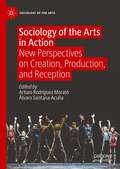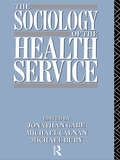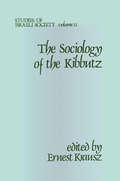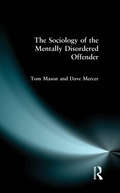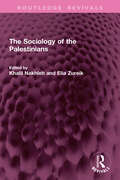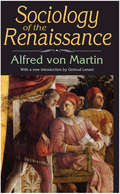- Table View
- List View
The Sociology of News
by Michael SchudsonThe Sociology of News offers a brief, but comprehensive account of the origins, structures, operating practices, codes, and cultures of the contemporary news media, analyzing the question of the consequences of news on society--and politics.
A Sociology of Place in Australia: Farming, Change and Lived Experience
by Claire BakerThis book weaves a social, economic and cultural history of Australia with rare first-hand accounts of the lived experience of change related to farming and agriculture. It provides a rich sociology of how living on the land has changed throughout Australia’s history. The book investigates the complex effects of the state on everyday life, using an historical agricultural case study of place to explore long-running sociohistorical processes of change examined through both a macro and micro sociological lens. This provides a multi-faceted perspective from which to examine economic, social and cultural transformations in each of these contexts and change is examined through multiple sites of expression: public policy and the role of the state; colonial processes of dispossession; social and cultural systems of value; economic change and its consequences; farming practices and lived experience; neoliberalism and globalisation and their social impacts; community decline and trends toward corporate and foreign land ownership. Each of these transformations impact upon lived experience and everyday life and this book provides grounded insight into exactly this relationship and process.
The Sociology of Power (Routledge Revivals)
by Roderick MartinFirst published in 1977, The Sociology of Power presents a broad comparative study in the sociology of domination by placing empirical research in political and industrial sociology in a comprehensive theoretical framework, derived from Marxism and social exchange theory. Roderick Martin argues that conventional definitions of ‘political sociology’ are no longer relevant, having been replaced by a revival of interest in wider problems, which need to be approached from new theoretical positions. He contends that what is needed is a more general definition, based on the analytical concepts of sociological theory. Three initial general chapters locate the study within the social action tradition and discuss problems of definition and measurement in detail. The major part of the book examines the distribution of power under different systems of labour exploitation-slavery, feudalism and especially capitalism. Professor Martin sees power as most concentrated in slavery, most dispersed in capitalism, and shows the extent and importance of this dispersal by a detailed discussion of power relations within industrial and political organizations, including trade unions and a critique of contemporary elitist theories. By reorienting political sociology around the concept of power and by analyzing the conventionally distinct fields of industrial and political sociology within a common theoretical framework, Roderick Martin offers a persuasive redefinition of the sociology of politics. This is a must read for scholars and researchers of sociology.
Sociology of Rationality: Critiques and Creative Conversations
by Soumyajit Patra Tattwamasi PaltasinghThis book is a socio-historical analysis of rationalism as a world view – that guides many of our actions in concrete everyday life – and as a philosophy – that guides our epistemological understanding of the reality around us. It explores the multifaceted manifestations of the idea in the Enlightenment philosophy, modern sociological theorising and post-structural standpoints. The volume also critiques rationality from feminist, subaltern and postcolonial perspectives. Finally, it delves into the multi-layered sociological significances of rationalisation of different domains of life. Transdisciplinary in scope and with essays by foremost scholars in the field, this volume will be a major intervention across the humanities and the social sciences. It will be of interest to students and researchers in sociology, anthropology, history, philosophy, gender studies, political science, cultural anthropology, education, and religious studies.
Sociology of Religion: Contemporary Developments
by Kevin Christiano Peter Kivisto William H. Jr. SwatosThis third edition of Sociology of Religion introduces students to key principles in the sociological understanding of religion, with revisions and updates throughout. The book offers an overview of the nature and function of religious institutions and practices, asking sociological questions about the changing role of religion in today’s “post-traditional” world.
Sociology of Religion: Overview and Analysis of Contemporary Religion (Theology And Religion In Interdisciplinary Perspective Series In Association With The Bsa Sociology Of Religion Study Group Ser.)
by Abby DayThe first sociology of religion textbook to begin the task of diversifying and decolonizing the study of religion, Sociology of Religion develops a sociological frame that draws together the personal, political and public, showing how religion – its origins, development and changes – is understood as a social institution, influenced by and influencing wider social structures. Organized along sociological structures and themes, the book works with examples from a variety of religious traditions and regions rather than focusing in depth on a selection, and foregrounds cultural practice-based understandings of religion. It is therefore a book about ‘religion’, not ‘religions’, that explores the relationship of religion with gender and sexuality, crime and violence, generations, politics and media, ‘race’, ethnicity and social class, disease and disability – highlighting the position of religion in social justice and equality. Each chapter of this book is framed around concrete case studies from a variety of Western and non-Western religious traditions. Students will benefit from thinking about the discipline across a range of geographical and religious contexts. The book includes features designed to engage and inspire students: Up-to-date and comprehensive analysis of engaging and accessible material ‘Case Examples’: short summaries of empirical examples relating to the chapter themes Visually distinct boxes with bullet points, key words and phrases focusing on the context Questions suitable for private or seminar study Suggested class exercises for instructors to use Suggested readings and further readings/online resources at the end of each chapter Following a review and critique of early sociology of religion, the book engages with more contemporary issues, such as dissolving the secular/sacred binary and paying close attention to issues of epistemology, negotiations, marginalities, feminisms, identities, power, nuances, globalization, (post) (multiple) modernity (ies), emotion, structuration, reflexivity, intersectionality and urbanization. This book is essential reading for undergraduate and postgraduate students exploring the sociology of religion, religion and society, religious studies, theology, globalization and human geography.
The Sociology of Religion: An Introduction to Theoretical and Comparative Perspectives
by Malcolm B. HamiltonThe Sociology of Religion is a comprehensive and wide-ranging introduction to theoretical debates in the sociology of religion, placing these theories in the context of specific religious beliefs and practices. Using examples as diverse as primitive religions, Buddhism, millenial movements, the Protestant Ethic, secularisation, cults and the new religious movements, Malcolm Hamilton demonstrates the multiplicity of religious traditions and enables readers to place their own experiences in a wider context. He draws on both historical and anthropological perspectives in his examination of religious practices and outlines the work of major sociological theorists including Marx, Durkheim, Malinowski and other Functionalists, Frazer and Weber in the examination of world religion, bringing these theories up-to-date. The significance of each theoretical perspective is illustrated by chapters on particular beliefs and practices.
The Sociology of Religion: Theoretical and Comparative Perspectives
by Malcolm B. HamiltonThis clear introduction to the sociology of religion combines a discussion of key theorists with a modern emphasis on the diversity of religious beliefs and practices. Malcolm Hamilton's expanded second edition brings the discussion fully up-to-date, and extends its material on secularization and religious sects, giving a broad comparative view. Drawing on the insights of history, anthropology and sociology, he surveys classic and contemporary theory to give a full picture of the variety and scope of theoretical perspectives.
Sociology of Sexualities
by Kathleen J. Fitzgerald Kandice L. GrossmanSociology of Sexualities by Kathleen J. Fitzgerald and Kandice L. Grossman is the first comprehensive text to approach the study of sexuality from a sociological perspective. Drawing on the most up-to-date social scientific research on sexuality, it discusses fundamental concepts in the field and helps students integrate knowledge about sexuality into their larger understanding of society. Topics covered include the emergence of sexual identities, inequalities and discrimination faced by sexual and gender minorities, heterosexual and cisgender privilege, activism and mobilization to challenge such discrimination, the commodification of sexuality, and the ways sexuality operates in and through various institutions. Throughout the text, the authors show how sexuality intersects with other statuses and identities.
Sociology of Sexualities
by Kathleen J. Fitzgerald Kandice L. GrossmanSociology of Sexualities by Kathleen J. Fitzgerald and Kandice L. Grossman is the first comprehensive text to approach the study of sexuality from a sociological perspective. Drawing on the most up-to-date social scientific research on sexuality, it discusses fundamental concepts in the field and helps students integrate knowledge about sexuality into their larger understanding of society. Topics covered include the emergence of sexual identities, inequalities and discrimination faced by sexual and gender minorities, heterosexual and cisgender privilege, activism and mobilization to challenge such discrimination, the commodification of sexuality, and the ways sexuality operates in and through various institutions. Throughout the text, the authors show how sexuality intersects with other statuses and identities.
Sociology of Sexualities
by Kathleen J. Fitzgerald Kandice L. GrossmanSociology of Sexualities takes a unique sociological approach to the study of sexualities and explores the ways sexuality operates in and through institutions. Drawing on the most up-to-date scientific research on sexuality, as well as the latest political developments on the issues, this core text helps readers connect knowledge about sexuality with their broader understanding of society. The thoroughly revised Second Edition includes updated and expanded discussions of the latest sociological research and social justice movements regarding gender and sexuality, as well as a new chapter exploring sexuality and social class, space, and place.
Sociology of Sexualities
by Kathleen J. Fitzgerald Kandice L. GrossmanSociology of Sexualities takes a unique sociological approach to the study of sexualities and explores the ways sexuality operates in and through institutions. Drawing on the most up-to-date scientific research on sexuality, as well as the latest political developments on the issues, this core text helps readers connect knowledge about sexuality with their broader understanding of society. The thoroughly revised Second Edition includes updated and expanded discussions of the latest sociological research and social justice movements regarding gender and sexuality, as well as a new chapter exploring sexuality and social class, space, and place.
Sociology of Sexualities
by Kathleen J. Fitzgerald Kandice L. GrossmanSociology of Sexualities is an insightful exploration of sexuality through a sociological lens, offering a comprehensive understanding of sexualities and gender identities. The Third Edition brings to light the current societal challenges faced by LGBTQ+ and reproductive rights, the influence of technology on sexuality, and the impact of the COVID-19 pandemic on sexual behaviors.
Sociology of Sexualities
by Kathleen J. Fitzgerald Kandice L. GrossmanSociology of Sexualities is an insightful exploration of sexuality through a sociological lens, offering a comprehensive understanding of sexualities and gender identities. The Third Edition brings to light the current societal challenges faced by LGBTQ+ and reproductive rights, the influence of technology on sexuality, and the impact of the COVID-19 pandemic on sexual behaviors.
The Sociology of Social Work (Routledge Revivals)
by Martin DaviesHow do sociologists explain the role and function of social work in society? How has sociological knowledge been used, adapted and misused by social workers? Originally published in 1991, The Sociology of Social Work includes chapters on sociological theory and social work, child protection, community care, probation interviews, family therapy, residential care, race, and knowledge and power.
Sociology of South Asia: Postcolonial Legacies, Global Imaginaries
by Smitha Radhakrishnan Gowri VijayakumarThis edited volume moves the study of South Asia to the center of sociological analysis, bringing together recent scholarship across sites in India, Sri Lanka, Nepal, and Pakistan, as well as in Ethiopia and the USA. This book situates the project of decolonizing the discipline within a rich transnational intellectual legacy and reveals how South Asia offers a uniquely generative site from which to rethink sociological practice. Recognizing local and global influences at their specific sites, the contributing authors highlight the historical ravages of colonialism and imperialism, modernization projects of the postcolonial era, and the kaleidoscopic ways in which gender, caste, class, and sexuality structure everyday life under neoliberalism today. The sociology of South Asia centers the voices and experiences of those marginalized by local and global systems of power in order to produce knowledge that advances interconnected projects of liberation.
The Sociology of South Asian Women’s Health
by Sara Rizvi JafreeThis contributed volume is the first-known collection of essays that brings together scholarly review, critiques, and primary and secondary data to assess how sociocultural factors influence health behavior in South Asian women. The essays are authored by working scholars or healthcare practitioners from Bangladesh, India, and Pakistan. In the chapters, the contributors acknowledge social, economic, and environmental factors to recommend improved interventions and health policy for women of the region.Studies on South Asian women’s health have targeted clinical evidence, with less attention on social and environmental factors driving health recovery and health outcomes. The South Asian region, more than any other part of the world, is driven by traditional and cultural forces that are possibly the most significant factors determining a woman’s health awareness and her rights to adopt healthy behavior or pursue health recovery. Women of the region share a common culture and political history, and there are benefits to understanding their problems collectively in order to design joint improvements in health policy for women.Salient, but neglected, socio-political areas that influence health behavior and health outcomes in women of the region are covered in the chapters including:Oral Narrations of Social Rejection Suffered by South Asian Women with Irreversible Health Conditions Women’s Role in Decision-Making for Health Care in South Asia Poverty, Health Coverage, and Credit Opportunities for South Asian WomenRefugee, Displaced, and Climate-Affected Women of South Asia and Their Health ChallengesThe Political Sociology of South Asian Women’s HealthThe Sociology of South Asian Women’s Health is a useful resource for students, researchers, and academicians, especially those interested in public health, gender, social policy, and occupational management, as well as healthcare practitioners, administrators, health and public policy-makers, government officers, and scholars of South Asian studies.
The Sociology of Space: Materiality, Social Structures, and Action (Cultural Sociology)
by Martina LöwIn this book, the author develops a relational concept of space that encompasses social structure, the material world of objects and bodies, and the symbolic dimension of the social world. Löw’s guiding principle is the assumption that space emerges in the interplay between objects, structures and actions. Based on a critical discussion of classic theories of space, Löw develops a new dynamic theory of space that accounts for the relational context in which space is constituted. This innovative view on the interdependency of material, social, and symbolic dimensions of space also permits a new perspective on architecture and urban development.
The Sociology of Structural Disaster: Beyond Fukushima (Routledge Studies in Science, Technology and Society)
by Miwao MatsumotoHow and why did credible scientists, engineers, government officials, journalists, and others collectively give rise to a drastic failure to control the threat to the population of the Fukushima disaster? Why was there no effort on the part of inter-organizational networks, well-coordinated in the nuclear village, to prevent the risks from turning into a disaster? This book answers these questions by formulating the concept of "structural disaster" afresh. First, the book presents the path-dependent development of structural disaster through a sociological reformulation of path-dependent mechanisms not only in the context of nuclear energy but also in the context of renewable energy. Secondly, it traces the origins of structural disaster to a secret accident involving standardized military technology immediately before World War II, and opportunistic utilization of the Great Kanto Earthquake of 1923, thus reconstructing the development of structural disaster within a long-term historical perspective. Maintaining distance from conflicts of interest and cultural essentialisms, this book highlights configurations and mechanisms of structural disasters that are far more persistent, more universal, but less visible, and that have turned risk into suffering. The book seeks to cast light on an important new horizon of the science-technology-society interface in the sociology of science and technology, science and technology studies, the sociology of disaster, the social history of the military-industrial-university complex, and beyond.
Sociology of the Arts in Action: New Perspectives on Creation, Production, and Reception (Sociology of the Arts)
by Arturo Rodríguez Morató Alvaro Santana-AcuñaThis edited collection carries out an extensive coverage of the sociology of arts’ most characteristic thematic areas (production, creation, the artwork, and reception) across an important range of artistic fields, from the most traditional to the more unusual. It makes an argument for the theoretical creativity and empirical expansion that characterizes the study of contemporary sociology of the arts. Such creativity is present in the increasingly predominant approach to a sociology of the arts in action, in all areas of inquiry within the discipline. The range of theoretical paradigms evoked is rich, analysing several of the most important theoretical frameworks currently handled in the discipline (Bourdieu, Becker, Peterson, ANT), and combining them with the works of many other influential contemporary specialists (De Nora, Hennion, Lamont, Menger and Born et al.). The book also establishes links to less known theoretical frameworks and some from different fields including economic sociology,microsociology, ethnomethodology, semiotics, and cultural history. The volume argues that Spanish-speaking scholars are now at the forefront of new developments in the field of the sociology of the arts, and is the first effort to gather research by these influential Spanish-language scholars in a single volume for an English-language audience.
The Sociology of the Health Service
by Jonathan Gabe Michael Calnan Michael BuryThe Sociology of the Health Service responds directly to the need to develop a sociological analysis of current health policy. Topics covered vary from privatisation and health service management to health education and the politics of professional power. Also included is an histroical review of sociology's contributions to health policy and proposals for an agenda for sociological health policy research in the 1990s.
Sociology of the Kibbutz
by ERNEST KRAUSZ; DAVID GLANZThis is the second volume of the publication series of the Israeli Sociological Society, whose object is to identify and clarify the major themes that occupy social research in Israel today. Studies of Israeli Society gathers together the best of Israeli social science investigation, which was previously scattered in a large variety of international jour-nals. Each book in the series is in-troduced by integrative essays.The contents of volume two focus on the sociology of a unique Israeli social institution—the kibbutz. Kib-butz society constitutes an impor-tant laboratory for the investigation of a variety of problems that have been of perennial concern to the social sciences. Topics in this volume include relevant contem-porary issues such as the dynamics of social stratification in a "classless" society, the function and status of the family in a revolutionary society, relations between generations, industrializa-tion in advanced rural communities, and collective economies versus the outside world. The questions of the concept and development of the kib-butz, social differentiation and socialization, and work and produc-tion within the kibbutz possess a significance far beyond their im-mediate social context. Does the kibbutz offer a model for an alter-native, communal lifestyle for the modern world? How has the kibbutz changed over the past decadeswithin the context of a rapidly modernizing Israeli society?Emphasizing the "nonfailure" of the kibbutz experiment and con-trasting it with many socialist, cooperative, and communal ex-periments that clearly did fail, Martin Buber, in his analysis, attributes this success to the kib-but/'s undogmatic character, its ability to adapt structures and in-stitutions to changing conditions, while preserving its essential values and ideals.This volume presents an excellent review of the social research under-taken on the kibbutz in the past decades, and provides an introduc-tion to the growing scientific literature on the kibbutz.Contributors: Melford E. Spiro, Menachem Rosner, Martin Buber, Joseph Ben-David, Daniel Katz, Naftali Golomb, Erik Cohen, Arye Fishman, Michael Saltman, S.N. Eisenstadt, Eva Rosenfeld, Amitai Etzioni, Ephraim Yuchtman, Eliezer Ben-Rafael, Nissim Cohen, Yonina Talmon-Garber, Joseph Shepher, Lionel Tiger, Edward C. Devereux, Reuben Kahane, Ivan Vallier, David Barkin, John W. Bennet, Yehuda Don, Uri Leviatan, Eliette Orchan, Shimon Shur and David Glanz.
The Sociology of the Mentally Disordered Offender
by Tom Mason Dave MercerIn recent years mentally disordered offenders have attracted considerable attention in the media and there has been heated public debate as to the best treatment and prevention of re-offending. Simultaneously there has been a significant increase in the amount of research, specialist courses and training devoted to this particular, high profile area of mental health care. This is as a result of considerable public pressure to develop effective theory and practice for diagnosing and treating this patient group.A Sociology of the Mentally Disordered Offender provides a concise, and most importantly, accessible guide to the main theoretical issues from a sociological perspective as a counterbalance to the predominant medical model. Having established a theoretical framework through the exploration of topics such as the relationship between crime and mental disorder the authors look at the processes by which offenders are referred either to criminal justice or the mental health service system, their subsequent treatment and management, and the problem of re-offending. A final chapter looks at ways in which care and management of these patients may be effectively developed in the future.
The Sociology of the Palestinians (Routledge Revivals)
by Khalil Nakhleh Elia ZureikFirst published in 1980, The Sociology of the Palestinians is a comprehensive collection of sociological and demographic studies of the Palestinian people. One paper deals with the Palestinian Arabs in pre-1967 Israel and the various methods of social control adopted by the Zionist regime to co-opt and control the Arab population. A second paper focuses on the Palestinians in the West Bank and Gaza. An analysis of current Palestinian demography with projections for the future is made, and the minority position of the Palestinians in the Arab World is critically assessed. An examination of the role of Palestinian intellectuals is followed by a theoretical discussion on the development of Palestinian class structure. Finally, the role of Palestinian women is examined in the context of traditional social structure and the specific political and economic situation which confront Palestinian society. This book will be of interest to students of history, sociology, and political science.
Sociology of the Renaissance (International Library Of Sociology Ser. #Vol. 9)
by Elizabeth FreidheimThis classic work marks the culmination of a definite stage in the socio-economic historiography from the late Middle Ages to the rise of the haute bourgeoisie in the early Renaissance. Here Alfred von Martin attempts to discover and define the spirit or essence of the Renaissance, and with it the spirit of early capitalism as it arose in Florence.His analysis focuses on the capitalist haute bourgeois who represented the economically, politically, and culturally dominant class of the Renaissance. As he shows, eventually its decline brings about a new stasis in the aristocratization of the great bourgeoisie as well as the rise of despotism in the fourteenth and fifteenth centuries.The shift from an agricultural to a commercial economy was unquestionably one of the essential elements in the transition from medieval to Renaissance civilization. This book's republication is a welcome development and will make this classic accessible again to scholars of the Renaissance and Renaissance humanism. In addition to its new introduction, it also includes a bibliography of von Martin's extensive writings.
